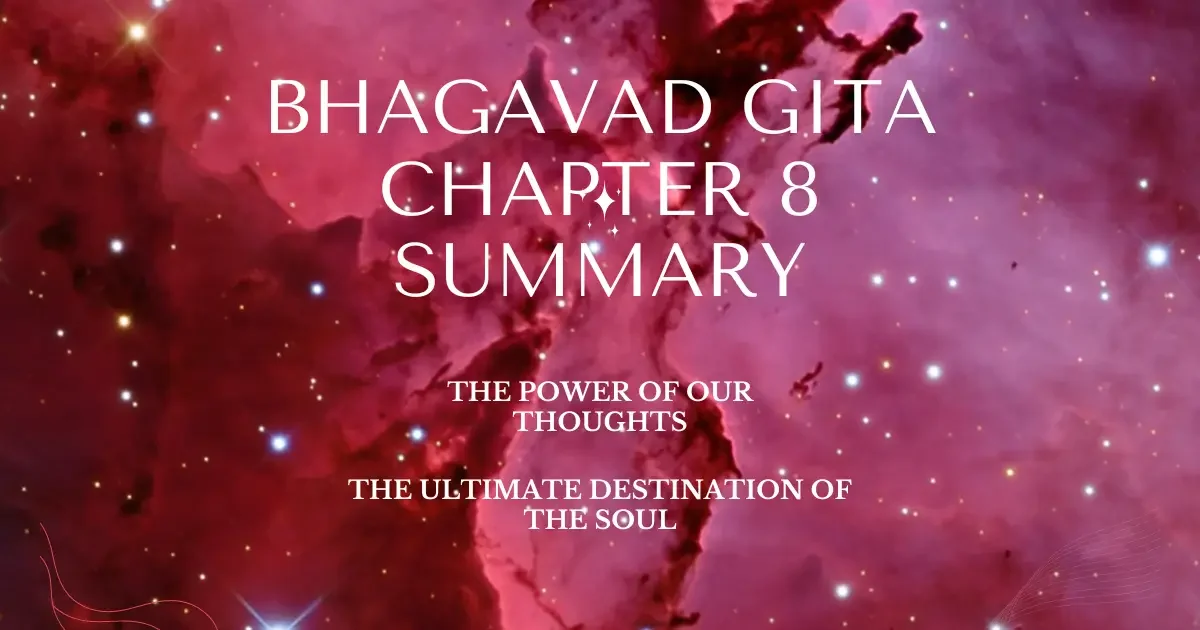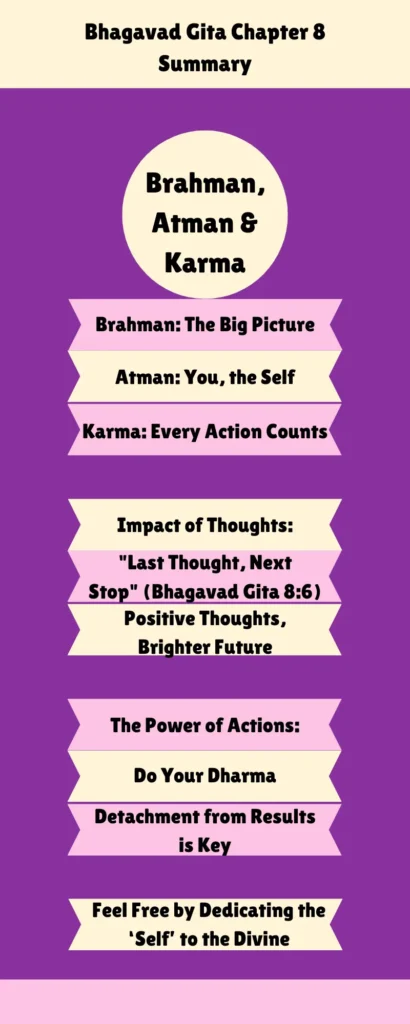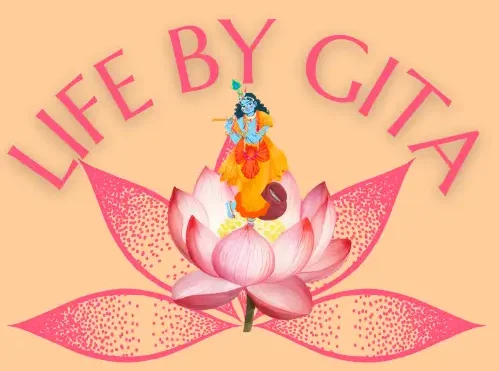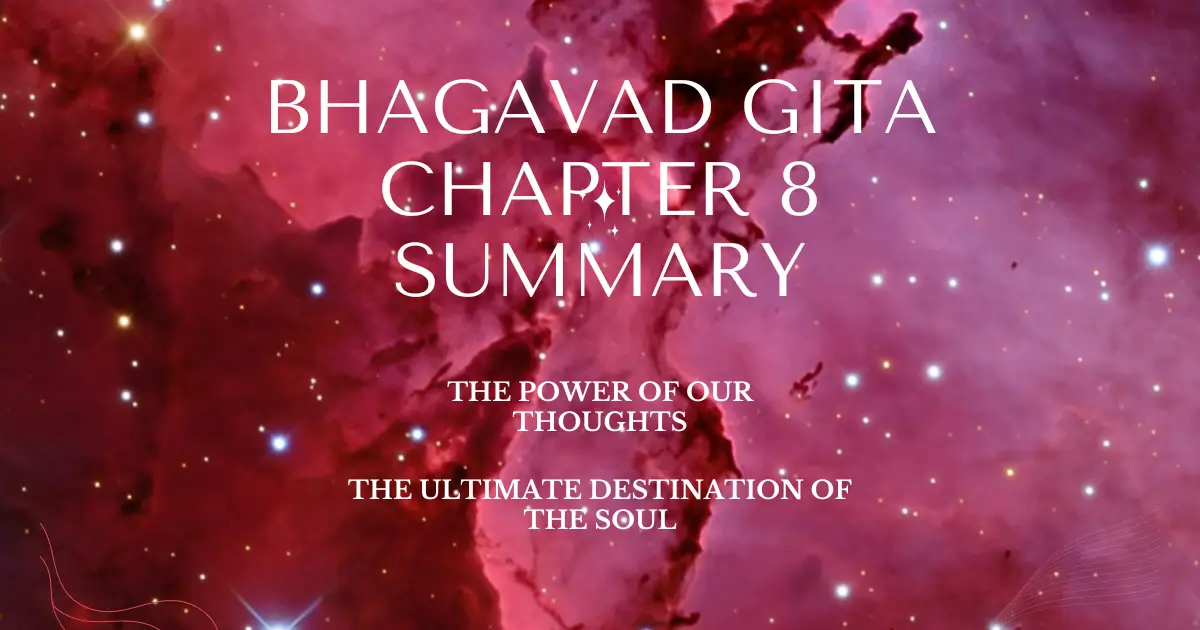
Hello everyone! Picking up right where we left off in Chapter 7, Arjuna is still wrestling with some serious life (and afterlife) questions. Remember how Krishna revealed his divine form? Now, Arjuna wants to know more about the ultimate reality – the Dominant force, the one true source of everything.
1. Introduction
Chapter 8 of the Bhagavad Gita titled Akshara Brahma Yoga or The Yoga of the Imperishable Brahman dives deep into the nature of existence, the power of our thoughts, and the ultimate destination of the soul. This chapter is packed with wisdom that’s as relevant today as it was thousands of years ago. Let’s get started.
2. Decoding the Universe: Brahman, Atman, and Karma
Krishna starts by giving us some key terms:
 Brahman (Ultimate Reality): The eternal, unchanging reality that underlies everything. Think of it as the cosmic soup from which everything is created. It includes not only the physical world but also the underlying reality, the consciousness, and the essence from which everything arises. Imagine the universe as a giant ocean. Brahman would be the infinite source of water that feeds the ocean. The ocean itself is vast and amazing, but it’s just one aspect of the whole.
Brahman (Ultimate Reality): The eternal, unchanging reality that underlies everything. Think of it as the cosmic soup from which everything is created. It includes not only the physical world but also the underlying reality, the consciousness, and the essence from which everything arises. Imagine the universe as a giant ocean. Brahman would be the infinite source of water that feeds the ocean. The ocean itself is vast and amazing, but it’s just one aspect of the whole.- Atman: The individual soul, the spark of Brahman within each of us.
- Karma: The law of action and reaction. Our actions (both good and bad) have consequences that shape our future.
Here’s a powerful verse that ties these concepts together:
“The imperishable supreme is Brahman, the Self (Atman) is the dwelling place, and action (karma) is the cause of rebirth for those who do not know Me.” (Bhagavad Gita 8:18)
Translation Breakdown: There’s an underlying, eternal reality (Brahman) that everything comes from. Our true Self (Atman) is connected to this reality, but our actions (karma) keep us stuck in the cycle of rebirth if we’re not enlightened.
3. Modern Day Relevance
We often get caught up in the daily grind, forgetting that there’s something bigger than ourselves. This verse reminds us that our actions have consequences, and if we want to break free from the cycle of problems, we need to focus on connecting with that deeper reality.
The Power of Your Last Thought
Chapter 8 emphasizes the importance of our state of mind at the time of death. Here’s another verse that beautifully captures this idea:
“Whatever state of being one remembers at the time of leaving the body, that state one attains, O Partha (Arjuna).” (Bhagavad Gita 8:6)
Translation Breakdown: Basically, what you’re thinking about most intensely when you die will influence where you go next.
Modern Day Relevance: This is a powerful reminder to be mindful of our thoughts. If we’re constantly dwelling on negativity, it will affect our present and our future. By focusing on positive thoughts and cultivating a spiritual connection, we can shape a brighter destiny.

4. Conclusion: A Glimpse into a Profound Journey
Chapter 8 of the Bhagavad Gita offers a glimpse into the vast ocean of wisdom this ancient text holds. We explored the concepts of Brahman, the ultimate reality, Atman, the individual soul, and Karma, the law of action and reaction. We saw how our thoughts and actions shape our destiny, not just in this life, but beyond.
The key takeaway? Be mindful. The state of mind we cultivate at the time of death plays a crucial role in what comes next. By focusing on positive thoughts, cultivating a spiritual connection, and performing our actions with detachment, we can shape a brighter future for ourselves.
This blog is just the beginning. There’s so much more to discover in the Bhagavad Gita. Keep reading, keep questioning, and embark on your own spiritual journey. Every chapter delves into a new layer of wisdom, waiting to be discovered.
Remember, the Bhagavad Gita Chapter 8 summary is just the tip of the iceberg. There’s a whole ocean of wisdom waiting to be explored!
If you have any question or comment, feel free to leave it in the comment box at the bottom.
Want to read this summary offline? You can download the pdf version below:
Bhagavad Gita Chapter 8 Summary pdf
5. FAQs
Q: Is there anything I can do to improve my state of mind at the time of death?
A: The Gita emphasizes the power of yoga and meditation. By training your mind to focus and cultivating devotion to a higher power, you can ensure a peaceful transition.
Q: Does this mean I shouldn’t focus on worldly things at all?
A: Not necessarily! The key is to perform your actions (karma) without attachment to the results. Do your duty, but don’t let your desires control you.
Further Reading
vedanta vision

